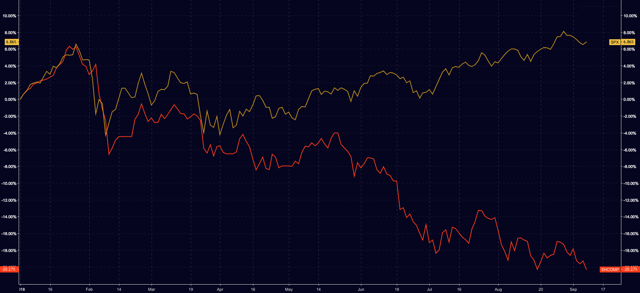Back in July, I penned a post for this platform that took a closer look at the notion that because U.S. stocks are riding high while Chinese equities are mired in a bear market, the U.S. is "winning" the trade war.
Obviously, that proposition doesn't make a whole lot of sense on its face, because after all, stocks aren't trade. Clearly, the prospect of a protracted trade conflict with the most dynamic economy in the world (America's) isn't great news for China, and the trade frictions have indeed served to undercut sentiment when it comes to Chinese equities. But you can't just point to the S&P (SPY) and the Shanghai Composite, evaluate relative performance, and then make a determination about a trade conflict. That's so simplistic an idea that I'm not sure why anyone takes it seriously.
Even if that's how you wanted to evaluate the situation, the S&P's outperformance this year is hardly confined to mainland shares in China. U.S. stocks have outperformed almost everything and A-shares aren't the only thing that's in a bear market. Emerging market equities (EEM) on whole fell into a bear market last month, European financials are in a bear market, so are European autos, and copper slid into bear market territory in August as well. The trade war is a factor, but it is entirely likely that U.S. stocks would have suffered a similar (if less severe) selloff this year were it not for the fact that the same policies which have supported the dollar in 2018 (i.e., late-cycle fiscal stimulus in the U.S.) have also been a boon to U.S. stocks (e.g., the tax cuts catalyzing record buybacks and bolstering corporate bottom lines).
The combination of a stronger dollar (UUP), a Fed that's inclined to hawkishness, record U.S. profits, record buybacks from U.S. corporates
